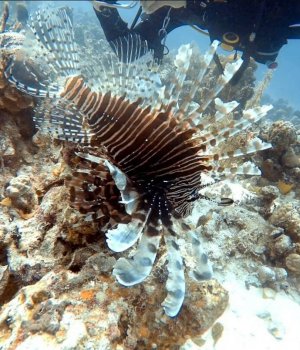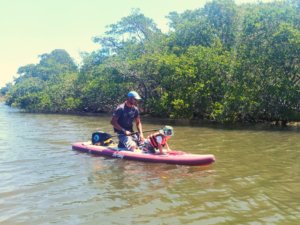Cuba, a vibrant Caribbean island known for its rich history and stunning landscapes, also offers a hidden gem beneath its turquoise waters. Diving and freediving enthusiasts flock to this tropical paradise to explore its diverse marine ecosystems, colorful coral reefs, and plenty of marine life.
From the pristine Jardines de la Reina to the captivating Bay of Pigs, Cuba's underwater world promises unforgettable experiences for both beginners and experienced divers.
In this article, we'll delve into some of the best diving and freediving destinations in Cuba, providing insights and tips for an extraordinary aquatic adventure.
Top Places for Scuba Diving & Freediving in Cuba
1. Jardines de la Reina
Located off Cuba's southern coast, Jardines de la Reina, or the Gardens of the Queen, is a marine park renowned for its untouched natural beauty. This protected area stretches over 1,000 square kilometers and is home to some of the healthiest coral reefs in the Caribbean.
Diving in Jardines de la Reina offers encounters with an incredible diversity of marine life, including colorful tropical fish, rays, turtles, and even sharks.
Der Meerespark wurde passenderweise nach einem Besuch von Christoph Kolumbus benannt, der ihn der spanischen Königin Isabella widmete. Da der Einfluss des Menschen hier begrenzt ist, gedeihen die Riffe mit einer Vielzahl von Hart- und Weichkorallen, Schwämmen und Seegraswiesen. Das klare, warme Wasser bietet hervorragende Sichtverhältnisse und ist damit ein Paradies für Unterwasserfotografen

2. María la Gorda

Situated on the western tip of Cuba, María la Gorda is a hidden gem for divers and freedivers seeking unspoiled beauty. Its remote location has preserved the area's pristine coral reefs, teeming with an incredible array of marine life. Snorkelers can enjoy the vibrant shallow reefs, while divers can explore the dramatic drop-offs, underwater caves, and fascinating walls that plunge into the depths.
María la Gorda is a heaven for marine biologists and nature enthusiasts, offering encounters with species like gorgonians, sponges, angelfish, parrotfish, and even elusive seahorses. The visibility is often outstanding, allowing divers to appreciate the underwater wonders in crystal-clear waters. It's advisable to bring an underwater camera to capture the mesmerizing moments.
3. Isla de la Juventud
Located off Cuba's southern coast, Jardines de la Reina, or the Gardens of the Queen, is a marine park renowned for its untouched natural beauty. This protected area stretches over 1,000 square kilometers and is home to some of the healthiest coral reefs in the Caribbean.
Diving in Jardines de la Reina offers encounters with an incredible diversity of marine life, including colorful tropical fish, rays, turtles, and even sharks.


4. Bay of Pigs
Beyond its historical significance, the Bay of Pigs offers an underwater playground for divers and snorkelers. This area is known for its diverse marine life and fascinating underwater topography.
The calm, clear waters and shallow reefs near the shoreline are ideal for snorkeling, allowing visitors to marvel at the vibrant coral gardens and observe schools of colorful fish.
Best time to dive & freedive in Cuba
The best time to go diving and freediving in Cuba generally coincides with the dry season, which runs from November to April. During this period, the weather is typically warm and dry, with lower chances of rainfall and more stable sea conditions.
However, it's important to note that Cuba's tropical climate allows for diving and freediving opportunities year-round. Here's a breakdown of the seasons and their diving highlights:
Dry Season (November to April)
This period is considered the peak season for diving and freediving in Cuba. The water visibility is generally excellent, ranging from 20 to 30 meters (65 to 100 feet), and the sea conditions are calm. The average water temperature ranges from 25 to 29 degrees Celsius (77 to 84 degrees Fahrenheit). You can expect warm weather and pleasant air temperatures during this time. This season is ideal for exploring sites like Jardines de la Reina, María la Gorda, Isla de la Juventud, and the Bay of Pigs.
Wet Season (May to October)
The wet season in Cuba coincides with the Caribbean hurricane season. Although the region experiences occasional rainfall and increased humidity during this time, it does not mean that diving and freediving opportunities are completely ruled out.
In fact, some divers prefer this period due to the slightly warmer water temperatures and the possibility of encountering larger marine species. However, it's important to keep an eye on weather forecasts and be prepared for occasional storms.


Safety Measures and Preparations
Research and Choose Reputable Operators
Before embarking on any diving or freediving adventure in Cuba, it's essential to research and select reputable dive operators or tour companies.
Be sure to have experienced and certified instructors, well-maintained equipment, and a strong focus on safety standards. Request your diving or freediving activities via Cubanture to ensure a reliable and trustworthy experience.
Obtain Necessary Certifications and Training
If you plan to scuba dive in Cuba, ensure that you have the necessary certifications based on your experience level. If you're a beginner, consider taking a beginner diving course in Cuba or even obtaining an Open Water Diver certification as it is much cheaper than in other countries.
Experienced divers should carry their certification cards as proof of training. It's also a good idea to brush up on your diving skills and knowledge through refresher courses if you haven't dived in a while.
Check Equipment and Gear
If you have your diving or freediving gear, thoroughly inspect it before your trip to ensure it is in proper working condition. Check for any signs of damage, ensure the regulators are functioning correctly, and verify the integrity of the snorkel, fins and mask.
Pack Essential Items
Aside from your diving or snorkeling equipment, consider packing other essential items for your trip. These may include sunscreen, a hat, sunglasses, a rash guard or wetsuit, a water-resistant camera or underwater housing, powerbank and more battieries in case of power cuts, and a first aid kit. It's also advisable to bring a surface marker buoy (SMB) or safety sausage, a signaling device that enhances your visibility on the surface.
Stay Hydrated and Use Sun Protection
Cuba's tropical climate calls for proper hydration and sun protection. Drink plenty of water throughout the day to stay hydrated, especially when participating in water activities. Apply waterproof sunscreen with a high SPF rating to protect your skin from the sun's harmful rays.
Dive and Freedive within Your Limits
Regardless of your experience level, it's crucial to dive and freedive within your comfort zone and skill level. If you're a beginner, stick to guided dives and shallow snorkeling spots until you gain confidence and experience. Experienced divers should always assess their skills and limitations when planning more challenging dives or exploring new areas.
Follow Dive Briefings and Safety Guidelines
Pay close attention to dive briefings provided by instructors or dive masters. Familiarize yourself with the specific dive site, potential hazards, and emergency procedures.
Follow the recommended depth limits, bottom times, and safety protocols. Always dive with a buddy and maintain good communication throughout the dive.
Respect Marine Life and Reef Conservation
While diving or freediving in Cuba, remember to respect the marine life and reef ecosystem. Do not touch, harass, or collect any marine organisms or coral formations.
Be mindful of your fins and body position to avoid unintentional damage to the delicate coral reefs. Practice responsible diving and snorkeling techniques, such as buoyancy control and proper fin kicks, to minimize your impact on the underwater environment.
Be Aware of Currents and Weather Conditions
Stay informed about the local weather conditions and tidal movements before heading out for a dive or snorkel session. Strong currents can be present in certain areas, so it's crucial to have knowledge and experience in managing them.
If conditions are unfavorable or dangerous, it's important to follow the advice of local authorities and dive professionals and postpone or cancel your dive plans.

Frequently asked questions
Yes, diving is popular in Cuba, especially among diving enthusiasts who are drawn to its pristine coral reefs, abundant marine life, and clear waters. Cuba offers a variety of diving sites suitable for both beginners and experienced divers.
Yes, you will need a diving certification to participate in scuba diving in Cuba. If you are not certified, you can consider taking a diving course and obtaining an Open Water Diver certification before your trip or do it even during your stay.
This might also be interesting for you
SUP in Cuba – Stand-Up-Paddling with the kids in Havana
Ruhig treibt das SUP-Brett (Akürzung für Stand-Up-Paddling) den Fluss entlang....
Read moreStand-Up Paddle Boarding (SUP) in Cuba
Wenn wir von Tropenparadies gepaart mit reicher Geschichte, lebendiger Kultur...
Read more

